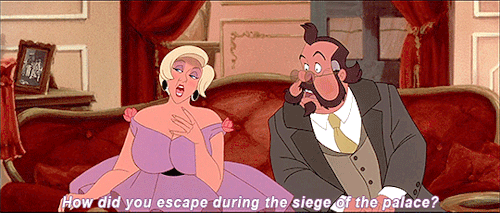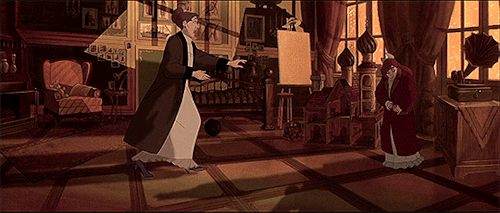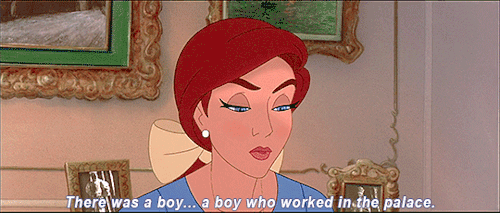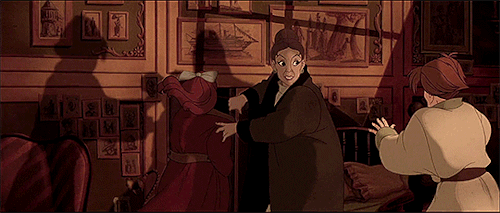This Is Almost Certainly A Post Ive Made Before But When A Character's Grief Is So Strong It Fully Alters
this is almost certainly a post ive made before but when a character's grief is so strong it fully alters the form of the narrative itself... moby dick being so much longer than strictly necessary because ishmael's grief made him stall for time in the telling of the tragedy... harrow the ninth being in second person because harrow was so grief-stricken that she herself was not capable of making narrative sense of the events of the novel and so someone else had to do it.... do u know what i mean
More Posts from Agent-ishiguro and Others
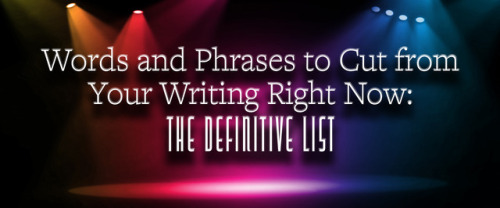
So, so many works I’ve read could be vastly improved with tightening and shaving of superfluous words. Wordiness is an easy stumbling block, as we’re used to how we talk. We’re used to how others (long ago) wrote. But times change, my friend, and so do expectations of the writer. We don’t get paid by the word in fiction. So show your smarts and say as much as you can with as much power as you can in as few words as possible.
Here are a few things you can cut without reserve to help shorten your story right now. And as you catch yourself using these words in your next draft, hit that backspace before you finish the sentence! It’s okay if you already have. You can go delete them now. No one will ever know.

Moment/Second/Minute
It’s so tempting. I am guilty of using this word like fertilizer in my first drafts. But most of the time, these words aren’t needed at all. They add nothing.
He sat down for a moment, sipping his coffee. vs. He sat down and sipped at his coffee.
But he only did it for a moment, you say!
He sat down for a moment, sipping his coffee. When the door opened a second later, he shot to his feet. vs. He sat down and sipped his coffee. The door opened, and before he could swallow his first sip, he shot to his feet.
I know, this is about making your writing more concise and my “right” example has more words than the first example. But what’s the difference? The words used in the second sentence are more tangible. They give a visual that “a second later” and “for a moment” don’t. And you could leave that part out, of course, if you’re really going for trimming word count. It doesn’t paint quite the same image, but “The door opened and he shot to his feet.” is a perfectly good sentence.
Suddenly/All of a sudden
You’ve heard this one, before, surely. These words are used…when? When you’re trying to portray suddenness. Surprise, perhaps. So why are you adding in extra words to slow down the pace?
She flipped on the TV and reclined in her chair. All of sudden, the TV flashed a bright light and the power went out. vs. She flipped on the TV and reclined in her chair. The TV flashed once before the lights went dark. The power was out.
That sense of immediacy is felt when stuff just happens. So let it happen. If it’s rhythm you’re worried about, then find more useful words to create the rhythm. Notice that I didn’t just cut “All of a sudden” out of the sentence and leave it. I reworded it a bit to make it stronger.
Finally
It can be a useful word, but more often than not, it’s just taking up space.
Really/Very
Just…delete them.
To alter a Mark Twain quote:
“Substitute ’[fucking]’ every time you’re inclined to write ‘very;’ your editor will delete it and the writing will be just as it should be.”
But seriously, if you’re saying, “She was breathing very hard.” You could just cut the “very” and say, “She was breathing hard.” Or, even better, “She was panting.” Or, EVEN BETTER: “She panted.”
Himself/herself/myself/themselves
Reflexive nouns have a specific purpose, though they can still often be avoided. They fall into the category of “use only when it’s confusing otherwise.”
Correct: He looked at himself in the mirror. Better: He looked in the mirror.
Incorrect: She gave them to Andrew and myself before leaving. Correct: She gave them to Andrew and me before leaving.
Technically correct I guess: I haven’t eaten lunch myself. (Intensive pronoun; aka waste of words) Better: I haven’t eaten lunch.
Intensive pronouns add emphasis, but that emphasis is negligible and often negated by the power of tightening your narrative.
That
You can likely cut 60% of your “that"s and your story will be unaffected. Sometimes, you do need to add a “that” here and there for clarification, but not always. And sometimes it’s just plain incorrect.
The jacket was the coolest one that he’d ever owned. vs. The jacket was the coolest one he’d ever owned.
In other cases, you might do well to substitute “that” with “which.” Though, if you’re doing this, make sure you do it properly. That change can often alter the meaning of your sentence. That can be for the better, though.
The vandalism that read “Bad Wolf” made Rose nervous. vs. The vandalism, which read “Bad Wolf,” made Rose nervous.
Do you see the difference? In the first sentence, the words are what make Rose nervous. In the second, the vandalism itself makes Rose nervous, and it happens to say “Bad Wolf.” In this case, if you’ve watched Doctor Who, then you know the first example is the correct one.
So when you’re sharing details using “that” or “which,” contemplate how important they are to meaning of the sentence to determine which type of clause you need to use.
Then
Or worse, “And then.”
It makes your writing sound a bit juvenile. Either cut it entirely, or substitute “and.”
She jumped into the pool, then hit her head on the bottom. vs. She jumped into the pool and hit her head on the bottom.
And then, after all that time, she fell asleep. vs. After all that time, she fell asleep.
Even
Sometime “even” can help emphasize a situation or behavior, but when it’s used in narrative improperly, it sounds childish and silly.
He couldn’t even breathe. vs. He couldn’t breathe.
Even with the new hair gel, his hair was terrible. (This one is fine, though you could still cut that “even” if you really wanted to…)
Just
Just…Delete it.
Breathe/breath/exhale/inhale/sigh/nod/shrug
Another one I’m so guilty of. In my first drafts, I tend to talk about how a character is breathing, or when they’re sighing like nobody’s business. I know a lot of writers who are guilty of this, too. It’s a great tool to use scarcely. In intense moments, you can let your character take a final deep breath to calm themselves. When a character almost drowns, those first few sweet breaths are important. But you readers know that people breath all the time. And just because you need a beat in your dialogue doesn’t mean you need to remind your reader that the character is still breathing or moving.
Rather/quite/somewhat
She was rather tall. She was tall. He was quite idiotic. He was idiotic. They were somewhat snazzy. They were snazzy. Why do you need those words? Kill ‘em.
Start/begin
This is a great example of fluff.
She started to run toward the shop. vs. She ran toward the shop.
He began scolding them for their performance. vs. He scolded them for their performance.
There are obviously uses for this word, like anything. He started the car. Begin your tests! But when you’re using it to slow the action and the pace of your narrative, then consider heavily if you need it. You probably don’t.
In order to/in an attempt to
Phrases that add unneeded complications, cumbersome wording…kill ‘em!
She bit down in an attempt to stop herself from screaming. vs. She bit down to stop herself from screaming.
Was able to
He was able to call. vs. He could call. OR He called.
This is one that isn’t inherently bad, but it can easily be overused and cutting it will help simplify your narrative.
Due to
Ugh. Are you trying to sound proper and stuffy? Because that’s a reason, I guess, to use this phrase…and yet it sounds like doodoo. (Yes. I’m an adult.) Rephrase. Use “Because of” or just avoid the need altogether.
We stopped due to traffic. vs. We stopped because of traffic. OR (Strength of narrative!) We stopped mid-highway. The parked cars went on beyond the curve of the road, out of sight.
Visibly/obviously/apparently/audibly
These are a sign of telling in your narrative when you should probably be showing.
She was visibly shaking. –> She shivered, hugging her upper arms. He was obviously tired. –> He yawned and tripped on his own feet as he crossed the room. They were apparently angry. –> They stomped and shouted, demanding attention. She screamed audibly. (Really?) –> She screamed.
Don’t tell your readers what emotion a character is feeling. Instead, give a few clues that they can see/hear/feel the emotion too.
While
This word has lots of legitimate uses. However, if you’re using it poorly, then your narrative reads like an Early Reader’s book, and you (unless that’s what you’re writing) probably don’t want that.
“Get it together,” he said while flipping them off. vs. “Get it together,” he said, flipping them off.
Turned
One of the classics. So overused, my friends. It’s needed on occasion, but not nearly as often as we use it. Just cut it out.
They turned toward her as they spoke. vs. They gave her their full attention as they spoke. OR They looked into her eyes. OR (Nothing. Readers don’t have to be updated on every little movement.)
Saw/looked/regarded
UGH. Regarded:Looked::Mentioned:Said
And, like “said,” many, many instances of these words can be nixed.
She saw them run for the hills. vs. They ran for the hills.
This can be tricky, I know, when you’re writing in limited-third or first POV. It’s tempting to put every action directly through your POV character’s filter. But resist that temptation! There are times when it’s appropriate, occasionally, but it can be overdone so easily.
I looked at her and said, “Please.” vs. I said,“ Please.” OR. I took her hand. “Please.”
This example sides with the breathing and the turning. It’s often an unneeded update on the tiny movements of the characters. And, again, sometimes you need that beat or that little detail in an intense moment, but not often.
Said/replied/stated/spoke/mentioned/asked/commented/yelled/cried/shouted
I’m not here to tell you to cut all your dialogue tags (please don’t). I’m also going to the last person who insists you get rid of “said.” In fact, I’m in the “said is invisible” party of writing nerds and I think, if you’re going to use a standard tag, it should be “said” 90% of the time.
But aside from that, using as few dialogue tags as possible is a good thing. I’ll do a full post on this soon, but for now, be aware of how often you rely on these words in your dialogue and do your best not to overuse them. Use surrounding action and context to take some of the reliance off of these words.
To-Be in all its conjugated forms
If you’re using any of this list:
am, is, are, was, were, be, being, had been
Then check yo'self. Some tenses call for an auxiliary verb. Some types of sentence do, too, not doubt about it. But many don’t, and cutting to-be verbs when you can will help tighten your writing.
We were going to the store. vs. We went to the store.
Sounds were echoing through the chamber. vs. Sounds echoed through the chamber.
To-be verbs can also be an indicator of passive voice, though they aren’t always.
He was hit by the ball. vs. The ball hit him.
Last but not least, check all of your adverbs.
Chances are, if you’re using an adverb, you could be using a single strong verb instead and giving each sentence more punch.
He ran quickly. –> He sprinted. I hit him hard. –> I socked him. She spoke quietly. –> She whispered. They ran into each other fast. –> They crashed.
So what am I supposed to do about this?
Take it to heart. Try not to let these words take over your brain as you write. Once your manuscript is finished, try this method:
Use Find and Replace. Replace any and all of the aforementioned words in ALL-CAPS. Now, if you’ve paid attention to my advice in using emphasis, then those all-caps will really stick out as you’re reading over your work and you can decide at each instance whether your usage is appropriate, or if it needs to be rewritten. As I did to this very old draft of mine from my first NaNoWriMo (in which I used every single word on this list, I’m sure).

When I used this method with my most recent WIP, I was able to cut my word count from 105k to 93k without cutting any content whatsoever. It takes a lot of work and it’s pretty tedious but the results are amazing!

It wouldn’t be the English language without exceptions, would it?
Now, there is actually an important time for intentionally using any or all of the words on this list. You know when that is?
When it fits the character’s voice. - More on this in my next post!
Words to replace said, except this actually helps
I got pretty fed up with looking for words to replace said because they weren’t sorted in a way I could easily use/find them for the right time. So I did some myself.
IN RESPONSE TO Acknowledged Answered Protested
INPUT/JOIN CONVERSATION/ASK Added Implored Inquired Insisted Proposed Queried Questioned Recommended Testified
GUILTY/RELUCTANCE/SORRY Admitted Apologized Conceded Confessed Professed
FOR SOMEONE ELSE Advised Criticized Suggested
JUST CHECKING Affirmed Agreed Alleged Confirmed
LOUD Announced Chanted Crowed
LEWD/CUTE/SECRET SPY FEEL Appealed Disclosed Moaned
ANGRY FUCK OFF MATE WANNA FIGHT Argued Barked Challenged Cursed Fumed Growled Hissed Roared Swore
SMARTASS Articulated Asserted Assured Avowed Claimed Commanded Cross-examined Demanded Digressed Directed Foretold Instructed Interrupted Predicted Proclaimed Quoted Theorized
ASSHOLE Bellowed Boasted Bragged
NERVOUS TRAINWRECK Babbled Bawled Mumbled Sputtered Stammered Stuttered
SUAVE MOTHERFUCKER Bargained Divulged Disclosed Exhorted
FIRST OFF Began
LASTLY Concluded Concurred
WEAK PUSY Begged Blurted Complained Cried Faltered Fretted
HAPPY/LOL Cajoled Exclaimed Gushed Jested Joked Laughed
WEIRDLY HAPPY/EXCITED Extolled Jabbered Raved
BRUH, CHILL Cautioned Warned
ACTUALLY, YOU’RE WRONG Chided Contended Corrected Countered Debated Elaborated Objected Ranted Retorted
CHILL SAVAGE Commented Continued Observed Surmised
LISTEN BUDDY Enunciated Explained Elaborated Hinted Implied Lectured Reiterated Recited Reminded Stressed
BRUH I NEED U AND U NEED ME Confided Offered Urged
FINE Consented Decided
TOO EMO FULL OF EMOTIONS Croaked Lamented Pledged Sobbed Sympathized Wailed Whimpered
JUST SAYING Declared Decreed Mentioned Noted Pointed out Postulated Speculated Stated Told Vouched
WASN’T ME Denied Lied
EVIL SMARTASS Dictated Equivocated Ordered Reprimanded Threatened
BORED Droned Sighed
SHHHH IT’S QUIET TIME Echoed Mumbled Murmured Muttered Uttered Whispered
DRAMA QUEEN Exaggerated Panted Pleaded Prayed Preached
OH SHIT Gasped Marveled Screamed Screeched Shouted Shrieked Yelped Yelled
ANNOYED Grumbled Grunted Jeered Quipped Scolded Snapped Snarled Sneered
ANNOYING Nagged
I DON’T REALLY CARE BUT WHATEVER Guessed Ventured
I’M DRUNK OR JUST BEING WEIRDLY EXPRESSIVE FOR A POINT/SARCASM Hooted Howled Yowled
I WONDER Pondered Voiced Wondered
OH, YEAH, WHOOPS Recalled Recited Remembered
SURPRISE BITCH Revealed
IT SEEMS FAKE BUT OKAY/HA ACTUALLY FUNNY BUT I DON’T WANT TO LAUGH OUT LOUD Scoffed Snickered Snorted
BITCHY Tattled Taunted Teased
so remember that worldbuilding website, notebook.ai, that was goin around and everyone was so excited, but it turned out you had to pay a (frankly outrageous) subscription to access any of the best tools?
well i have exciting news: World Anvil.
here’s what you get for free:

yeah. all of them. double what notebook.ai offers for pay. yeah baby.
i’ve only been using this site for like half an hour, but i am in LOVE. please check it out and consider supporting the creators if you can!
Surnames are just as important as given names. So, I compiled a list of the websites I use to find my surnames.
English Surnames
Dutch Surnames
Spanish Surnames
Scottish Surnames
German Surnames
Italian Surnames
Irish Surnames
French Surnames
Scandinavian Surnames
Welsh Surnames
Jewish Surnames
Surnames By Ethnicity
Most Common Surnames in the USA
Most Common Surnames in Great Britan
Most Common Surnames in Asia
Hello! Would you mind doing an example of not using filter words in a first person point of view? While I know that you can just switch out the pronouns for I/me/my, I just want to see it in action and when you should (and shouldn't) use the filter words. Thank you!
Hi there! I would love to! I think I’ll start out with an example with filter words and then cut out the filter words to show you the difference.
For those of you who haven’t seen my post on Filter Words.
Now, for the example:
I felt a hand tap my shoulder as I realized I had made a huge mistake. I knew the consequences would be unsettling, but I had no other choice. I saw the light of my desk lamp bounce off of the officer’s badge before I had even turned around. It seemed like I always found my way into trouble.
It was the first thing off the top of my head, so it’s a bit rough sounding….
Now for without filter words (And a bit of revision):
A hand tapped my shoulder as it dawned on me: I had just made a huge mistake. The consequences would be unsettling if I didn’t get out of this mess, but I had no other choice. The light of my desk lamp bounced off of the officer’s badge. I always found my way into trouble.
By taking out filter words, you get right to the point.
I’d also like to add a few more notes that I didn’t have the chance to post previously.
Some Examples of Filtering:
I heard a noise in the hallway.
She felt embarrassed when she tripped.
I saw a light bouncing through the trees.
I tasted the sour tang of raspberries bursting on my tongue.
He smelled his teammate’s BO wafting through the locker room.
She remembered dancing at his wedding.
I think people should be kinder to one another.
How can you apply this?
Read your work to see how many of these filtering words you might be leaning on. Microsoft Word has a great Find and Highlight feature that I love to use when I’m editing. See how you can get rid of these filtering words and take your sentences to the next level by making stronger word choices. Take the above examples, and see how they can be reworked.
FILTERING EXAMPLE: I heard a noise in the hallway.
DESCRIBE THE SOUND: Heels tapped a staccato rhythm in the hallway.
FILTERING EXAMPLE: She felt embarrassed after she tripped.
DESCRIBE WHAT THE FEELING LOOKS LIKE: Her cheeks flushed and her shoulders hunched after she tripped.
FILTERING EXAMPLE: I saw a light bouncing through the trees.
DESCRIBE THE SIGHT: A light bounced through the trees.
FILTERING EXAMPLE: I tasted the sour tang of raspberries bursting on my tongue.
DESCRIBE THE TASTE: The sour tang of raspberries burst on my tongue.
FILTERING EXAMPLE: He smelled his teammate’s BO wafting through the locker room.
DESCRIBE THE SMELL: His teammate’s BO wafted through the locker room.
FILTERING EXAMPLE: She remembered dancing at his wedding.
DESCRIBE THE MEMORY: She had danced at his wedding.
FILTERING EXAMPLE: I think people should be kinder to one another.
DESCRIBE THE THOUGHT: People should be kinder to one another.
See what a difference it makes when you get rid of the filter? It’s simply not necessary to use them. By ditching them, you avoid “telling,” your voice is more active, and your pacing is helped along.
The above list is not comprehensive as there are many examples of filtering words. The idea is to be aware of the concept so that you can recognize instances of it happening in your work. Be aware of where you want to place the energy and power in your sentences. Let your observations flow through your characters with immediacy.
Ok, sorry for the lengthy answer, I know you just wanted an example…. sorry!
If you have any questions, feel free to ask at my ask box
🟢 You are still a writer even when you haven't written in a while.
🟢 You are still a writer even when you feel like you aren't writing enough.
🟢 You are still a writer when you feel like your work isn't good.
🟢 You are still a writer when other people don't like your work.
🟢 You are still a writer when you aren't published.
🟢 You are still a writer when you only have works in progress.
🟢 You are still a writer if all you write is fanfiction.
-
 is-it-hoofbeats-or-thunder reblogged this · 1 month ago
is-it-hoofbeats-or-thunder reblogged this · 1 month ago -
 quotebookcentral liked this · 1 month ago
quotebookcentral liked this · 1 month ago -
 king-craftsman liked this · 1 month ago
king-craftsman liked this · 1 month ago -
 wakemeupbeforeidream liked this · 1 month ago
wakemeupbeforeidream liked this · 1 month ago -
 mandala-lore reblogged this · 1 month ago
mandala-lore reblogged this · 1 month ago -
 fire-swift liked this · 1 month ago
fire-swift liked this · 1 month ago -
 jalkori reblogged this · 1 month ago
jalkori reblogged this · 1 month ago -
 bellarkeandclintashaandsuch liked this · 1 month ago
bellarkeandclintashaandsuch liked this · 1 month ago -
 lackofserotonine liked this · 1 month ago
lackofserotonine liked this · 1 month ago -
 tfcoorock reblogged this · 1 month ago
tfcoorock reblogged this · 1 month ago -
 rottenarmour reblogged this · 1 month ago
rottenarmour reblogged this · 1 month ago -
 ana-at-midnight reblogged this · 1 month ago
ana-at-midnight reblogged this · 1 month ago -
 ana-at-midnight liked this · 1 month ago
ana-at-midnight liked this · 1 month ago -
 theroundbartable liked this · 1 month ago
theroundbartable liked this · 1 month ago -
 sicheslavchyk reblogged this · 1 month ago
sicheslavchyk reblogged this · 1 month ago -
 sicheslavchyk liked this · 1 month ago
sicheslavchyk liked this · 1 month ago -
 princess-of-morkva reblogged this · 1 month ago
princess-of-morkva reblogged this · 1 month ago -
 princess-of-morkva liked this · 1 month ago
princess-of-morkva liked this · 1 month ago -
 odins-price liked this · 1 month ago
odins-price liked this · 1 month ago -
 0133444 reblogged this · 1 month ago
0133444 reblogged this · 1 month ago -
 centi-pearl liked this · 1 month ago
centi-pearl liked this · 1 month ago -
 gean-grey-blog reblogged this · 1 month ago
gean-grey-blog reblogged this · 1 month ago -
 helianthus-hellion reblogged this · 1 month ago
helianthus-hellion reblogged this · 1 month ago -
 anonimusunnoan reblogged this · 1 month ago
anonimusunnoan reblogged this · 1 month ago -
 fxckin-creature reblogged this · 1 month ago
fxckin-creature reblogged this · 1 month ago -
 fxckin-creature liked this · 1 month ago
fxckin-creature liked this · 1 month ago -
 stillamarls liked this · 1 month ago
stillamarls liked this · 1 month ago -
 averagecygnet-blog liked this · 1 month ago
averagecygnet-blog liked this · 1 month ago -
 candiedjellybean liked this · 1 month ago
candiedjellybean liked this · 1 month ago -
 a-star-dusted-royal reblogged this · 1 month ago
a-star-dusted-royal reblogged this · 1 month ago -
 missstevierae reblogged this · 1 month ago
missstevierae reblogged this · 1 month ago -
 simple-potato-farmer reblogged this · 1 month ago
simple-potato-farmer reblogged this · 1 month ago -
 vehicularjapery liked this · 1 month ago
vehicularjapery liked this · 1 month ago -
 needlekirby liked this · 1 month ago
needlekirby liked this · 1 month ago -
 wandering-aloneo-o reblogged this · 1 month ago
wandering-aloneo-o reblogged this · 1 month ago -
 yeahireblogsomethings reblogged this · 1 month ago
yeahireblogsomethings reblogged this · 1 month ago -
 lordchuckles044 reblogged this · 1 month ago
lordchuckles044 reblogged this · 1 month ago -
 bywi reblogged this · 1 month ago
bywi reblogged this · 1 month ago -
 witness-my-regression liked this · 1 month ago
witness-my-regression liked this · 1 month ago -
 warmwormwizard liked this · 1 month ago
warmwormwizard liked this · 1 month ago -
 that-one-brain-cell liked this · 1 month ago
that-one-brain-cell liked this · 1 month ago -
 themyscrian reblogged this · 1 month ago
themyscrian reblogged this · 1 month ago -
 northgreatern liked this · 1 month ago
northgreatern liked this · 1 month ago -
 nonbananon reblogged this · 1 month ago
nonbananon reblogged this · 1 month ago -
 nonbananon liked this · 1 month ago
nonbananon liked this · 1 month ago -
 thusspakesophie liked this · 1 month ago
thusspakesophie liked this · 1 month ago -
 gingerjaydraws liked this · 1 month ago
gingerjaydraws liked this · 1 month ago -
 urdykebf reblogged this · 1 month ago
urdykebf reblogged this · 1 month ago
things that might inspire me or help with with my writing skills
55 posts










